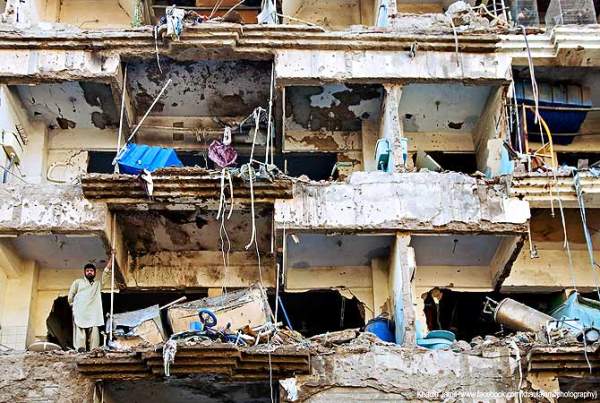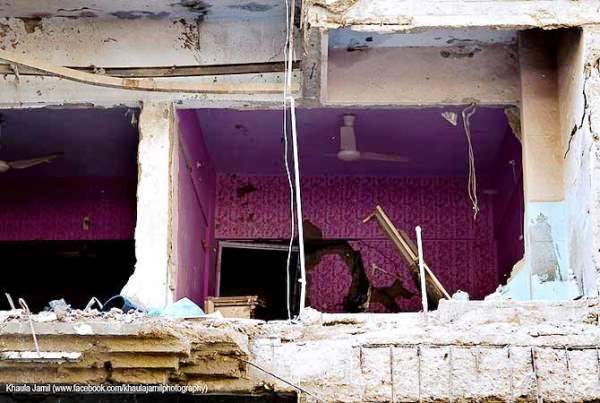
Lessons from Abbas Town: Stick together, whether you are Shia or Sunni
Abbas Town was not targeted because it had a sectarian problem; it was targeted because it did not have one.
In a town where Shias and Sunnis had lived together peacefully for years, worshipped just down the street from one another, played cricket and often sat together in the evenings to chat, a sign survived amongst the rubble which read in Urdu,
“A Muslim is a brother to another Muslim.”
It symbolised the brotherhood of the town’s Shias and Sunnis. It was such a town in Karachi, home to outspoken women and communal harmony that was struck by terror one year ago today.
“It looks like Israel bombarded Palestine,” exclaimed one man from Abbas Town as residents had approached Hamid Mir with one heart-wrenching account after another.
It certainly did.
The only difference is that if this had happened in Palestine perhaps we would not have witnessed the deafening silence we heard from those who would have otherwise jumped at the opportunity to curse the ‘West’s infidels’.
It’s heart breaking to revisit the footage of the destruction of the buildings at Abbas Town. In the devastating photos taken by Ali Khurshid and Humans of Karachi’s Khaula Jamil we saw a bicycle, doll, and other remnants of toys and scattered glass among the rubble.
 Photo: Khaula Jamil
Photo: Khaula JamilIt is a stark reminder that many children were violently snatched from this world whilst they played with their toys on the balconies of their apartments where they should have been safe. Karachi was not in the middle of a military operation at the time, it was not a war zone and there was no terrorist hiding in the building; still, innocent lives were deliberately targeted without the slightest hum of a warning.
We are warned that a day will come when the one murdered will not know why they were killed.
Unfortunately for Pakistan, that day has long come. Terrorists specifically target the innocent; they seek senseless destruction for no other reason than to cause maximum casualties; in retrospect they feel no remorse and offer no apologies for lives lost. And they commit grave atrocities as they invoke the name of a religion that is meant to be a mercy to mankind.
Those responsible for such attacks must be brought to justice no matter who they are – not just imprisoned and released. How many more such terrorist attacks must we wait for to speak out against terrorism, for at most another day or two?
Syed Ali Abbas Zaidi, the founder of the Pakistan Youth Alliance, had tweeted three days after last year’s atrocity,
“Countdown for the next attack has started. Typical silence and denial after a recent attack ensues.”
What is clear is that we cannot look the other way or remain silent if we strive for a Pakistan free of terror. How long will we continue to allow precious lives like that of Noor Alam – a rickshaw driver and father of four young children – who made an ill-fated stop in front of the buildings now defaced as if they suffered an acid attack and brave students like Aitzaz Hasan to be lost in vain?
We cannot wait to speak out until terror makes its way to our very own doorsteps because then it will simply be too late.
Martin Luther King Jr said,
“In the end, we will remember not the words of our enemies but the silence of our friends.”
As extremism grows in our societies we must decide: Do we want to be a society where many educated people are willing to speak out against listening to music, buying roses on Valentine’s Day and seek to control other’s personal choices, yet fail to utter a single word of condemnation or offer solace to grieving families because they are of a different sect?
If we cannot be good human beings, it’s a moot point that we could be good followers of any religion.
Unlike the terrorists and extremists of Pakistan, the residents of Abbas Town represented some of Pakistan’s highest ideals. The residents who buried their dead, among them Shia and Sunni, Mohajir and Pashtun – even with tender wounds and passions running high – say they have no sectarian problems amongst them and they are “one brotherhood”. Women said residents even intermarried without stigma. In fact, they defiantly stated that the terrorists have made them more resolute in their common humanity and love for one another.
Perhaps, this is precisely what the terrorists who attacked them hate most about them.
Abbas Town was not targeted by terrorists because it had a sectarian problem; it is likely that it was targeted because it did not have a sectarian problem and terrorists desired to create one. Terrorists are fighting to change the very landscape of the country. It’s imperative that important questions no longer be ignored.
 Photo: Khaula Jamil
Photo: Khaula JamilWhy is a blind eye being turned to terrorism and a growing epidemic of extremism?
It was promising, though long overdue, that the Anti-Terrorism Bill Amendment to the 1997 Act was passed in the National Assembly, in the aftermath of the Abbas Town terror attack, giving law enforcement the ability to collect audio/video recordings, wiretappings, emails and take action against those who finance terrorism. According to the US Country Report on Terrorism 2011, Pakistan has an 85% acquittal rate for terrorism cases. To keep Pakistan safe, we must assure terrorists are not acquitted by courts due to ‘lack of evidence’.
And why have so many terrorist attacks failed to be intercepted when officials are aware of the warnings? It is disturbing to say the least that then Governor Zulfiqar Magsi of Quetta had defeatedly declared,
“Officials and personnel of these institutions (provincial security and intelligence agencies) are scared (of the terrorists). Therefore they don’t take action against them.”
If so, what is being done about that fear and reluctance to act? Why are there allegations that terrorists may have free reign in certain parts of the country and have unscathed hideouts in places like Punjab? And how are we contributing? Are we teaching our children tolerance at a young age at home and in schools?
These questions must be addressed.
It’s becoming increasingly clear that Pakistan’s unsavoury relationships with terrorists must end once and for all if it wants to put a stop to such demons haunting its own citizens.
At such critical mourning periods for Pakistan, strong leadership is paramount, yet missing. Pakistanis are increasingly calling their leaders to be accountable to them and must continue to demand action when they fail to deliver. Politicians must realise that the biggest responsibility they have is the safety and protection of Pakistani masses. Yet we don’t hear the heartfelt speeches which encourage national mourning. Without mourning the deaths of fellow citizens mercilessly killed, how can we begin to heal our wounds?
Mohammad Raza, an eye-witness to last year’s horrors in Abbas Town, told reporters,
“If everyone had helped only those who belonged to their own sect, there would have been no survivors.”
Indeed there wouldn’t have. One is reminded of the quote from Martin Luther King Jr,
“We must learn to live together as brothers or perish together as fools.”
The choice is ours.


COMMENTS (2)
Comments are moderated and generally will be posted if they are on-topic and not abusive.
For more information, please see our Comments FAQ